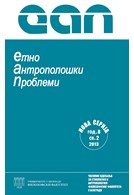Narativna reprodukcija savremenog crnogorskog identiteta u procesu Evroatlantskih integracija (II dio)
The Narrative Reproduction of Contemporary Montenegrin Identity in The Process of Euroatlantic Intergrations (Part II)
Author(s): Branko BanovićSubject(s): Anthropology, Transformation Period (1990 - 2010), Politics and Identity, Identity of Collectives
Published by: Филозофски факултет, Универзитет у Београду
Keywords: narrative; ontological narrativity; Montenegro; Congress of Berlin; Podgorica Assembly; the Uprising of July 13th; antifascism; referendum; Euro-Atlantic integrations;
Summary/Abstract: If we conceptualize reality as a large narrative we "build ourselves into" as social beings, and consider social activities and identities as narratively mediated, the full extent of the capacity of narratives in the creation, shaping, transmission and reconstruction of contemporary social identities, as well as the reproduction of the concept of nation in everyday life becomes apparent. - The imagined Euro- Atlantic future of Montenegro demands certain narrative interpretations of the past, which, in latter stages tend to become meta-narratives susceptible to consensus. The linkage of significant historical events to the process of Euro-Atlantic integrations of Montenegro is preformed through different meta-discursive practices, most often through ceremonial evocations of memories of significant events from the recent as well as further history of Montenegro. In this context, celebrations of Statehood Day and Independence Day are especially important, as they serve as reminders of the decisions of the Congress of Berlin, the Podgorica Assembly, the antifascist struggle of World War II and the independence of Montenegro attained through the - referendum held in 2006. The clearly defined key points, along with the logical coherence the narrative is based on, provide the narrative with a certain "flexibility" which enables it to take in new elements. Narrative interpretations of the past have a significant role in the reproduction of the nation, as well as the shaping and consolidation of a desirable national identity, while the established narrative continuity between the past, present and imagined Euro-Atlantic future of Montenegro emerges as the "official" mediator in the reproduction of contemporary Montenegrin identity in the process of Euro-Atlantic integrations. In order to fully comprehend this narrative, it is advisable to conceptualize it both in a synchronic as well as a diachronic perspective, as can be shown in two charts which, depending on the context, I have tentatively named "the sovereignty graph" (wherein the "end" of the narrative is a prerequisite for the beginning of Euro-Atlantic integrations) and "the identity graph" (wherein Euro-Atlantic integrations are conceptualized as a dialectic equilibrium of independence and non-independence).
Journal: Етноантрополошки проблеми
- Issue Year: 8/2013
- Issue No: 2
- Page Range: 519-537
- Page Count: 19
- Language: Serbian

